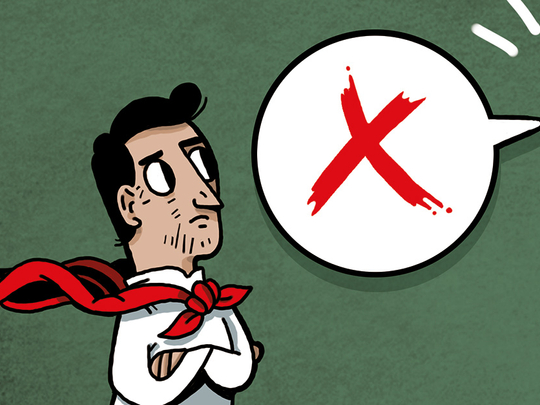
There comes a time in any society when one group with their set of values tries to impose their customs and beliefs on the rest of society. Today, we are witnessing it on a massive scale in the United States, with the Trump constituency at odds against those who oppose his vision for making America great again, and those who steadfastly reject all he stands for. Such politically inclined differences are the fodder on which democracy exists.
In our part of the world there are similar differences but which run on altogether different set of values. Religion or its interpretation by one segment of society which contradicts the beliefs of another often leads to a volatile exchange of words. Those holding the religious card convince themselves they are promoting their views from a superior level as they try to intimidate those who may disagree with their set of values.
Take the case of the recent Comic Con that was organised by Saudi Arabia’s new Entertainment Authority Commission and held last month. The three-day festival of anime, pop art, video gaming and film-related events attracted a largely youthful crowd of thousands from February 16-18 in the Red Sea city of Jeddah. It was part of a government initiative to bring more entertainment to the kingdom, where public cinemas and theatre are banned. The event included loud rock and other music in a cavernous dim hall adorned with famous comic figures. Hundreds of men and women mingling together respectfully, hooted in appreciation whilst clapping their hands to the rhythmic hip-hop beat.
The three-day event was a huge success with residents of the city who thronged by the thousands to take part in a novel outing that for many had been missing from the social scene for decades. Visitors to Comic Con interviewed by a foreign press agency unabashedly said they would welcome more such shows, and even cinemas. Video clips of the event soon found their way on social media networks.
Saudi Arabia’s cultural landscape was devoid and barren until recently when the 31-year-old Deputy Crown Prince Mohammad Bin Salman, keen to harness the energy of a young population, more than half of which are under 25, took it upon himself to provide more entertainment. This was seen as part of the goal of Saudi Arabia’s Vision 2030 economic diversification plan that is being pushed by the kingdom. By officially sanctioning the Entertainment Authority Commission, he signalled a sharp departure from the past.
There have been talks of cinemas finally being allowed in the kingdom and women given the right to drive. There have been concerts and shows which have been well received by an appreciative public. There is a new direction of cultural metamorphism that the kingdom is embarking upon. But there are those who find such a direction very alarming.
In January of this year, the kingdom’s highest-ranking cleric, Grand Mufti Abdul Aziz Al Shaikh, warned of the ‘depravity’ of cinemas and music concerts, partly because they represent a ‘call for mixing between sexes’. Undoubtedly his call fell on the sympathetic ears of his followers who took to social media to attack the kingdom’s first Comic Con pop culture festival as one inviting depravity.
Calling the event as ‘sinful and evil’, one remarked that ‘indecency, mixing with Muslim women, dancing and music cannot be called entertainment; it’s an invitation for debauchery and sinning.’
Another remarked that the Muslim country was not for dancing” and ‘Comic Con is the devil worshippers’ party in Jeddah’. Yet another objector tweeted that ‘the Entertainment Authority and its repeated provocations seek to normalise these evils among the people until they accept them, the worse is yet to come.’
A Saudi calling himself the son of Najd, the kingdom’s central province, called in a Twitter post for God to take revenge ‘against those who made our women dance in the midst of men with no shame and our men feel no jealousy, and make it an example for others’.
A Saudi from the southern region of the country called the efforts by the Entertainment Authority as ‘repeated provocations to the kingdom’s traditions’ and lamented that he was ‘sad that soldiers were fighting Yemeni rebels on the kingdom’s southern border while we commit these sins’.
Sins? What sins? And by whose definition? Such opposition within certain quarters of the country is indicative of the challenges the authorities have to overcome in order to introduce family entertainment to the country. The Entertainment Authority said in the aftermath that the organisers of Comic Com would be penalised for ‘unspecified violations’, adding that the Authority’s priority is ‘safeguarding values, morals and traditions’ in public entertainment. They also noted that the event’s ‘general success in terms of content and organisation’ was well received by an appreciative public.
An interesting observation to this entire furore is that most of those objecting were not from the city of Jeddah or had even been to the show. They were simply offended by the video clips of families including men and women, boys and girls mingling together in a large hall and having a good time. That obviously did not impress them and tugged at their traditional mores. And so they took to the airwaves to express their objections.
The rest of us who encourage decent family fare can only suggest to them that they do not have to join us in this journey of cultural renaissance. Nobody is forcing them to, and they too should not try to impose their values on us.
Tariq A. Al Maeena is a Saudi socio-political commentator. He lives in Jeddah, Saudi Arabia. You can follow him on Twitter at www.twitter.com/@talmaeena









